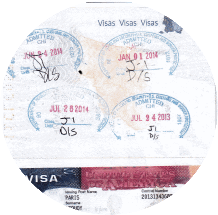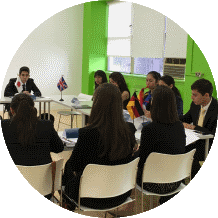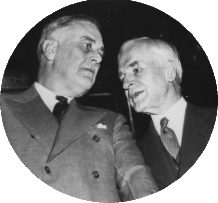
ELOISE ENGEL, Switzerland
French Immersion Teacher
On this shrunkin globe men can no longer live as strangers. — Adlai E. Stevenson
I grew up in a very international environment that allowed me to learn and understand many different cultures and languages. The prospect of living and working abroad has always been an interest of mine. I am fascinated by the variety of mentalities that exist across cultures. The possibility to enrich my teaching experience by working with students, parents and other teachers from around the world was always my dream. I began travelling as a child and I’ve since been to Asia, Africa and most of Europe. Until coming to teach, though, I’d never been to the US. To be honest, coming to America was never high on my list of destinations to live or to visit. But here I am, a part of this new country which I knew only from movies and the news.
Before coming to America, the vision of America that my friends and I shared could be boiled down to a nation of gas-guzzling, fast-food-eating, war-mongering, conspicuously consuming isolationists. To some degree, all of these stereotypes exist. Thankfully, Benjamin Disraeli was correct when he wrote that “travel teaches tolerance.” Living here has softened these stereotypes as well as exposed me to so many positive experiences as well. In fact, my perception of America and Americans changed as soon as I set foot on American soil.
With my passport clenched in my sweaty hands, I worried about the stories I heard about mean American immigration officers. Would I get a scowl and swift kick in the tail as they refused my visa and sent me back to France? Of course not. Instead, an exchange that was foreign to me at the time but has since become common happened: A total stranger smiled at me and said: “Hi, how are you doing?” I was fine! Everything went well and the doors open in front of me for a big adventure.
To be honest, I was shocked and even confused at times as people repeatedly asked me how I was doing. It was confusing because as nice as people were, asking me how I was doing was not the beginning of a conversation, although that’s what it seemed like to me. I realized that even though people want to know exactly how I was doing, always asking how one is doing is very nice way to recognize a stranger. It took me a while to understand that this way of being super friendly, yet casual and laid back, was part of the American way of communication. I have become accustomed and now enjoy people just walking by with a “How are you doing?” or to be asked to “Come back and visit” after a stay in a bed and breakfast or even a store. This incredible friendly way of being captured my heart. My experiences here in the United States continue to be marked by this friendliness. People talk to each other, even if they don’t know you.
When I visited France after a few months living abroad, I was shocked when nobody asked me how I was doing. I found myself back in Europe, defending America. I try to share my experiences, try to help my friends understand what America truly is, and is not.
I love living in America. I love the diverse wildlife, the variety of climates, and the mix of cultures as people from all over the world live in one country. Sure, I struggle with the traffic and cultural differences, but I open my eyes, listen and learn every day. Talking to people helps me to understand. Only by living here have I been able to understand the United States, and with this also the world. Thank you to the Cordell Hull Foundation to make this experience possible.






